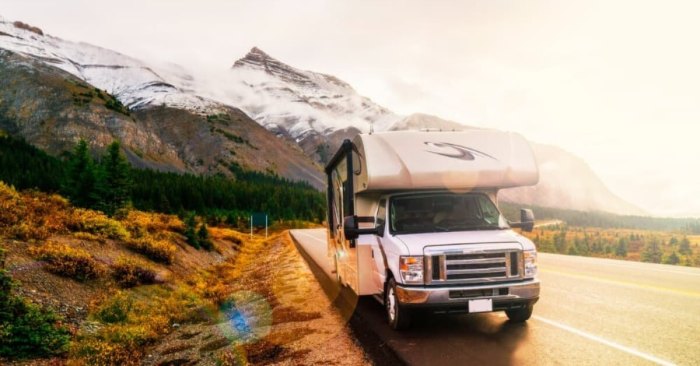Roadside coverage for RVs is a vital safety net for owners, offering protection and assistance during unexpected roadside emergencies. From flat tires to lockouts, having the right coverage can make all the difference in ensuring a smooth journey.
Importance of Roadside Coverage for RVs

Having roadside coverage for RVs is crucial for owners as it provides a safety net in case of unexpected breakdowns or emergencies while on the road. This service can offer assistance in various situations, ensuring that RV owners can continue their travels with peace of mind.
Liability coverage definition is a crucial aspect of insurance policies, providing protection against claims resulting from injuries or damage to property. Understanding this concept is essential for anyone seeking comprehensive coverage. To learn more about liability coverage definition, you can check out this informative article: Liability coverage definition.
Common Roadside Issues for RVs
RVs may encounter a range of common roadside issues that can disrupt travel plans and lead to costly repairs. Some examples include:
- Engine problems: RV engines can experience issues such as overheating, mechanical failures, or electrical malfunctions.
- Tire blowouts: Blowouts are a common occurrence for RVs due to their size and weight, leading to potential safety hazards.
- Battery failures: Dead batteries can leave RV owners stranded without power for essential systems like lighting or appliances.
- Fuel problems: Running out of fuel or encountering fuel system issues can leave RVs stranded on the side of the road.
Benefits of Roadside Coverage
Roadside coverage can provide peace of mind for RV owners by offering immediate assistance in case of emergencies. Some key benefits include:
- 24/7 emergency assistance: Roadside coverage typically includes around-the-clock support for various issues that may arise during travels.
- Towing services: In the event of a breakdown, roadside coverage can arrange for towing services to transport the RV to a repair facility.
- Lockout assistance: If RV owners accidentally lock themselves out of their vehicle, roadside coverage can provide locksmith services to regain access.
- Flat tire assistance: Roadside coverage often includes tire repair or replacement services to address common issues like blowouts or punctures.
Types of Roadside Services for RVs

When it comes to roadside services for RVs, there are various options available to cater to different needs and situations. Let’s explore the different types of roadside services and compare basic assistance with premium coverage.
Basic Roadside Assistance, Roadside coverage for RVs
Basic roadside assistance for RVs usually includes services such as towing, tire changes, fuel delivery, battery jump-start, and locksmith services. These services are essential for addressing common issues that RV owners may encounter while on the road.
- Towing: In case your RV breaks down and needs to be towed to a repair shop.
- Tire Changes: Assistance with changing a flat tire or repairing a damaged tire.
- Fuel Delivery: Running out of fuel can be a common issue, and this service ensures you get the fuel you need to reach the nearest gas station.
- Battery Jump-Start: If your RV battery dies, this service can help you get back on the road.
- Locksmith Services: Assistance in case you lock yourself out of your RV or lose your keys.
Premium Roadside Coverage
Premium roadside coverage for RVs often includes additional services on top of the basic assistance. These may include benefits such as tire replacement, trip interruption coverage, concierge services, and more personalized assistance tailored to RV owners.
- Tire Replacement: In case a tire is irreparable, premium coverage may include the cost of a new tire.
- Trip Interruption Coverage: Assistance with accommodations and transportation if your RV becomes inoperable during a trip.
- Concierge Services: Personalized assistance for travel planning, reservations, and other concierge services.
- Additional Technical Support: Premium coverage may offer more extensive technical support for complex RV issues.
Coverage Limitations and Exclusions: Roadside Coverage For RVs

When it comes to roadside coverage for RVs, it’s crucial for owners to be aware of the limitations and exclusions that may apply to their policies. Understanding these restrictions can help prevent unexpected expenses or disappointments during emergencies on the road.
Towing Distance Restrictions
Some roadside coverage plans may have limitations on the distance they will tow your RV to the nearest repair facility. For example, if your RV breaks down in a remote area far from the nearest service center, you may end up having to cover the additional towing costs beyond the coverage limit.
Labor Costs Exclusions
Certain roadside assistance policies may exclude coverage for labor costs associated with repairs. This means that even if your RV is towed to a repair shop, you may still have to pay for the actual repair work out of pocket. It’s essential to clarify if labor costs are covered in your policy to avoid any surprises.
Roadside Assistance Location Restrictions
Some roadside coverage plans may have restrictions on where assistance can be provided. For instance, if your RV breaks down on a private road or off-road location, the coverage may not apply. It’s crucial to understand the specific locations where roadside assistance is available under your policy.
Fine Print Details
It’s important for RV owners to carefully read and understand the fine print of their roadside coverage policies. This includes knowing the specific limitations, exclusions, and terms of the coverage to avoid any misunderstandings during emergencies. Being well-informed about the details of your policy can help you make informed decisions and be prepared for any unexpected situations on the road.
Choosing the Right Roadside Coverage for Your RV
When it comes to selecting the right roadside assistance plan for your RV, there are several factors to consider to ensure you have the coverage you need in case of an emergency. From the type of services offered to the limitations and exclusions of the plan, it’s essential to do your research and choose wisely.
Factors to Consider
- Extent of Coverage: Look for a plan that offers comprehensive coverage for a wide range of issues such as towing, fuel delivery, tire changes, and locksmith services.
- 24/7 Assistance: Make sure the provider offers round-the-clock assistance, as breakdowns can happen at any time of day or night.
- Distance Limitations: Check if there are any restrictions on the distance for towing services, especially if you plan on traveling long distances.
- Cost: Compare the cost of different plans and ensure you are getting good value for the services provided.
- Additional Benefits: Some plans may offer additional perks such as trip interruption coverage or concierge services, so consider what extras are important to you.
Comparison Table of Roadside Coverage Providers
| Provider | Services Offered | Cost | 24/7 Assistance |
|---|---|---|---|
| AAA | Towing, Fuel Delivery, Tire Changes | $100/year | Yes |
| Good Sam Roadside Assistance | Towing, Locksmith Services, Trip Interruption Coverage | $79.95/year | Yes |
| Coach-Net | Towing, RV Technical Support, Concierge Services | $159/year | Yes |
Tailoring Coverage Options
- Assess Your Travel Habits: If you frequently travel long distances, opt for a plan with higher towing limits and long-distance coverage.
- Consider Your RV Type: Different RVs may have specific needs, so choose a plan that caters to the size and weight of your vehicle.
- Personalize Your Plan: Many providers offer customizable options, allowing you to tailor your coverage based on your individual needs and preferences.
In conclusion, Roadside coverage for RVs is not just a convenience but a necessity for any traveler hitting the open road. With the right coverage in place, you can travel with confidence, knowing that help is just a phone call away.
What does comprehensive insurance cover? This question may arise when considering different insurance options. Comprehensive insurance typically covers damages not caused by a collision, such as theft, vandalism, or natural disasters. If you want to know more about what comprehensive insurance covers, you can read this detailed guide: What does comprehensive insurance cover?.
Custom vehicles often require specialized insurance coverage to protect their unique features. Comprehensive insurance for custom vehicles offers tailored protection for modifications, upgrades, and other enhancements. If you own a custom vehicle and want to learn more about comprehensive insurance options, check out this informative article: Comprehensive insurance for custom vehicles.



